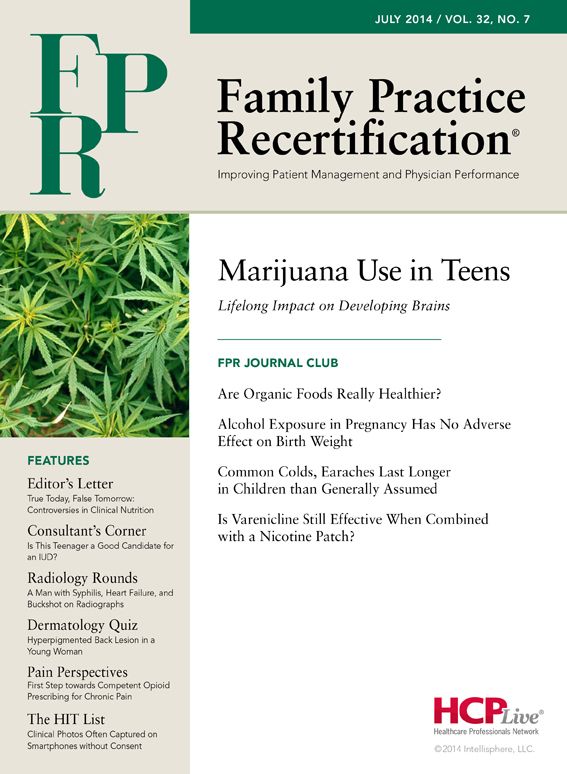Publication
Article
Family Practice Recertification
Common Colds, Earaches Last Longer in Children than Generally Assumed
Author(s):
It is generally assumed a viral infection will get better in "7 days with antibiotics and in roughly a week without them." As it turns out, these estimates are low, especially in children.
Frank J. Domino, MD
Review
Thompson M, et al. Duration of symptoms of respiratory tract infections in children: systematic review. BMJ. 2013 Dec 11;347:f7027. http://www.bmj.com/content/347/bmj.f7027.
This was a systematic literature review to determine the duration of common upper respiratory tract infections (URTIs) in children, such as earache, sore throat, common colds, and cough, including acute cough, bronchiolitis, and croup.
Results and Outcomes
More than 22,000 references were identified, but only 23 clinical trials and 25 observational studies met the inclusion criteria. The included papers were evaluated to determine the number of days at which each URTI symptom had resolved in 50% and 90% of children with that symptom.
In 90% of children, earache resolved by day 7-8, sore throat between 2-7 days, croup by 2 days, bronchiolitis by 21 days, acute cough by 25 days, common cold by 15 days, and non-specific URTI symptoms by 16 days.
Conclusion
The durations of most outpatient URTI symptoms in children are considerably longer than what guidelines in the US and the UK currently reference.
Commentary
It is generally assumed a viral infection will get better in “7 days with antibiotics and in roughly a week without them.” As it turns out, these estimates are low — especially in children — because it took considerably longer for the symptoms of the studied outpatient URTIs to improve in 90% of children. While it is reassuring that sore throats are resolved in 2-7 days, it remains troubling that cough-based conditions such as acute cough, bronchiolitis, and the common cold often take 2-3 weeks to improve.
The implications of this systematic review are significant. The current strategy of asking patients with suspected viral URTIs to follow-up if improvement does not occur “over the next few days” will likely lead to unnecessary and potentially dangerous interventions that range from additional chest X-rays to overprescribed cough suppressants and antibiotics. Inappropriately prescribed antibiotics have led to bacterial resistance in both inpatient and outpatient settings and resulted in soaring rates of Clostridium difficile infection. Therefore, this study should remind all healthcare professionals to reserve antibiotic use only for situations where a bacterial infection that will actually benefit from an antibiotic is present.
Many family physicians feel pressured by either parents or their own assumptions to prescribe “something” when a child is ill, even if they feel the infection will not benefit from an antibiotic. When feeling pressured to prescribe, here are some tips to keep in mind:
- Remind parents of the risks and benefits of an antibiotic when a bacterial infection is unlikely. Say the words “antibiotic-associated diarrhea” and describe the challenges of a week of watery stool and possible trips to the emergency room for intravenous (IV) fluids.
- Consider suggesting Pelargonium sidoides syrup 0.5 tsp tid, a safe and effective herbal treatment sold in most pharmacies. It has systematic review data supporting its role in reducing the length of a viral infection in both children and adults.1
- For generalized fever and body aches, encourage the use of acetaminophen (15 mg/kg every 6 hours) combined with nonsteroidal anti-inflammatory drugs (NSAIDs) like ibuprofen (10 mg/kg every 6 hours). Recommend administering both drugs at the same time, which is safe and very effective; alternating them increases the risk of overdose.
- Limit the use of prescription cough suppressants and decongestants — especially in among those aged <6 years — unless they are absolutely necessary, because they have no benefit in shortening the duration of an illness.
On the topic of when to treat, remember:
- Antibiotics have only been deemed effective in earache among those aged 6-23 months when strict criteria are met.2
- Sore throat should only be treated with antibiotics if Centor scores or rapid strep tests demonstrate benefit.3
- For the general runny nose and cough of a cold, only non-antimicrobial agents that are unlikely to produce adverse effects should be considered; antiviral medications indicated for influenza have no benefit.
- Cough without rales is most often a viral infection that can take weeks to resolve. Assuming there are no signs of reactive airway disease or respiratory distress, honey with or without lemon is a more effective treatment than agents like diphenhydramine.4
Finally, for both doctors and parents, a great deal of patience is essential.
References
1. Timmer A, et al. Pelargonium sidoides extract for treating acute respiratory tract infections. Cochrane Database of Syst Rev. 2013 Oct 22;10:CD006323. http://www.ncbi.nlm.nih.gov/pubmed/24146345.
2. Lieberthal AS. The diagnosis and management of acute otitis media. Pediatrics. 2013 Mar;131(3):e964-e999. http://www.ncbi.nlm.nih.gov/pubmed/23439909.
3. Choby BA. Diagnosis and treatment of streptococcal pharyngitis. Am Fam Physician. 2009 Mar 1;79(5):383-90. http://www.aafp.org/afp/2009/0301/p383.html.
4. Oduwole O. Honey for acute cough in children. Cochrane Database Syst Rev. 2012 Mar 14;3:CD007094. http://www.ncbi.nlm.nih.gov/pubmed/22419319.
About the Author
Frank J. Domino, MD, is Professor and Pre-Doctoral Education Director for the Department of Family Medicine and Community Health at the University of Massachusetts Medical School in Worcester, MA. Domino is Editor-in-Chief of the 5-Minute Clinical Consult series (Lippincott Williams & Wilkins). Additionally, he is Co-Author and Editor of the Epocrates LAB database, and author and editor to the MedPearls smartphone app. He presents nationally for the American Academy of Family Medicine and serves as the Family Physician Representative to the Harvard Medical School’s Continuing Education Committee.





